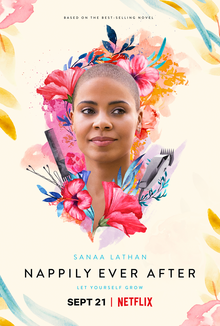Difference between revisions of "Nappily Ever After (2018)"
Skalexsong (talk | contribs) (Created page with "Nappily Ever After is a 2018 American romantic comedy film directed by Haifaa al-Mansour and written by Adam Brooks and Cee Marcellus. It is based on the novel of the same nam...") |
Skalexsong (talk | contribs) |
||
| Line 1: | Line 1: | ||
| − | Nappily Ever After is | + | '''Nappily Ever After''' (2018) is an American romantic comedy movies directed by Haifaa al-Mansour and written by Adam Brooks and Cee Marcellus. It is based on the novel of the same name by Trisha R. Thomas.<ref>https://en.wikipedia.org/wiki/Nappily_Ever_After</ref>[[File:Nappily Ever After.png|thumb|Nappily Ever After]] |
| + | ==Plot== | ||
| + | Violet Jones doesn't realize it at first but she's dismayed by her superficial, "perfect" life. She has everything she thought she'd need - a successful career, friends and a boyfriend who is a handsome doctor (Whittle). When her fairy tale begins to unravel, so does she. This movie shows what a beautiful, smart, successful woman can do when she starts to look inward instead of outward!<ref name=":0">https://www.imdb.com/title/tt0365545/</ref> | ||
| − | == | + | ==Controversy== |
| + | A black women's hair, is this movies all about, and what it's like for black women to live in a world where they're stigmatized because of their hair. Where they're considered unprofessional and uncivilized if they don't straighten it.<ref name=":0" /> | ||
| − | + | Netflix enters into a much larger conversation in world history through this film, holding up a mirror to repressive Eurocentric beauty ideals as they relate to black women and their hair.<ref>https://sojo.net/articles/nappily-ever-after-about-more-hair</ref> | |
| − | == Reference == | + | The situations major theme in the film, that what Black women do with their hair is somehow only valid if men deem it so. It has nothing to do with the Black women themselves and all to do with their desirability. The movies also spends a good majority of its time preaching the good gospel of going/returning to natural, but it does this by undermining Black women who are not natural, conceiving of them as inferior in some way.<ref>https://wearyourvoicemag.com/way-nappily-ever-attempts-celebrate-black-hair-actually-harmful/</ref> |
| + | |||
| + | ==Reference== | ||
[[Category:Black Racism in Comedy Movies]] | [[Category:Black Racism in Comedy Movies]] | ||
| + | <references /> | ||
Revision as of 11:12, 1 January 2021
Nappily Ever After (2018) is an American romantic comedy movies directed by Haifaa al-Mansour and written by Adam Brooks and Cee Marcellus. It is based on the novel of the same name by Trisha R. Thomas.[1]
Plot
Violet Jones doesn't realize it at first but she's dismayed by her superficial, "perfect" life. She has everything she thought she'd need - a successful career, friends and a boyfriend who is a handsome doctor (Whittle). When her fairy tale begins to unravel, so does she. This movie shows what a beautiful, smart, successful woman can do when she starts to look inward instead of outward![2]
Controversy
A black women's hair, is this movies all about, and what it's like for black women to live in a world where they're stigmatized because of their hair. Where they're considered unprofessional and uncivilized if they don't straighten it.[2]
Netflix enters into a much larger conversation in world history through this film, holding up a mirror to repressive Eurocentric beauty ideals as they relate to black women and their hair.[3]
The situations major theme in the film, that what Black women do with their hair is somehow only valid if men deem it so. It has nothing to do with the Black women themselves and all to do with their desirability. The movies also spends a good majority of its time preaching the good gospel of going/returning to natural, but it does this by undermining Black women who are not natural, conceiving of them as inferior in some way.[4]
